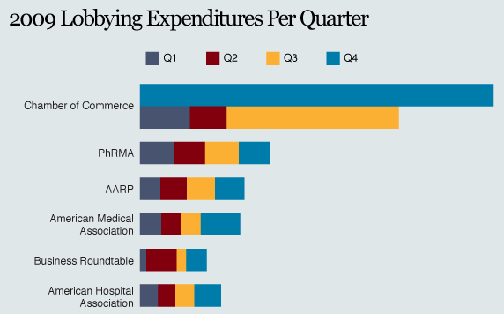Weiner tells Republicans they are owned by the Insurance industry. Don’t forget to mention MOST of the Democrats to.
[youtube]http://www.youtube.com/watch?v=BOQ2GEGm3v0&feature=player_embedded[/youtube]
[youtube]http://www.youtube.com/watch?v=BOQ2GEGm3v0&feature=player_embedded[/youtube]
Why is the US Chamber of Commerce spending soooooo much money to stick it to the little man?
The top-spending groups on health care reform generally spent about as much lobbying last year as they did in 2008 — with one notable exception. The U.S. Chamber of Commerce stood out not only for consistently outspending other groups, but also for nearly doubling its lobbying spending over the previous year. In the fourth quarter of 2009 alone, the group’s outflows easily topped the amount spent by any other group all year.

One wonders?
In a private meeting in the Capitol just now, a dozen or more House liberals bluntly toldNancy Pelosi that there was no chance that they would vote to pass the Senate bill in its current form — making it all but certain that House Dems won’t opt for this approach, a top House liberal tells me.
Of course, the Republicans have been spinning this like crazy, saying that some Democrats don’t support the bill for the same reasons they don’t, socialized medicine, which couldn’t be farther from the truth. A majority of Americans have said it should include a public option. Some polls were as low as 51% and some as high as 69% in support of the public option. I think they need to start from scratch and they should include two provisions (one that is a Republican idea and one that is a Democratic idea).
• Tax refunds for private insurance premiums, &
• A public option that ANY American can buy into and pay premiums thru payroll taxes
Without either one of those options, there really isn’t any reform. Reform should affect ALL Americans, not just the very poor or the very rich.

Attorney General Marty Jackley will be speaking at the DownTown Holiday Inn on Tuesday Jan 19th from 12-1:30 PM.  $15. Includes a buffet lunch with dessert. Open to the public.
Mr. Jackley is one of 15 attorneys general that is challenging the constitutionality of the Nebraska Compromise and Florida to purchase Senatorial votes.  This is a historic meeting. If you would like to attend there is limited seating. Please RSVP to 605-332-1962 by 10:00 a.m. Monday morning Jan 18.
sponsored by teapartysd.com
I’m not sure if I will attend, but I think it would be an interesting presentation.
A few weeks ago the Congressional Budget Office released an analysis that said tort reform would save the federal government $54 billion over ten years. That sounds like a great argument for tort reform. But if you read the analysis more carefully, you see the picture is not so simple. For example, on page 4 of the analysis you can find this little bombshell:
“CBO’s estimate takes into account the fact that because many states have already implemented some of the changes in the package, a significant fraction of the potential cost savings has already been realized.“
The fact is, more than half of the states already have “reformed†tort. The CBO is saying that federal tort reform would not give us an additional $54 billion in savings. Rather, we’re already enjoying a significant fraction of the $54 billion in savings because tort is already “reformed†in most states.
Wait, you didn’t notice that health care costs are dropping because of state tort reforms? That’s because they aren’t.
What we see in states like Texas, which has enacted sweeping “tort reform†laws, is that while the number of lawsuits go down the overall costs of health care and health insurance keep going up — as much as in states that haven’t changed their tort laws.
It is true that states with “reformed†tort law have seen a big reduction in the number of personal injury lawsuits and jury awards, which does save some money. But the costs of caring for people injured by malpractice, mesothelioma cancer, or other injuries from dangerous products or workplaces, don’t go away. And if the responsible party doesn’t pay, usually the rest of us do — in higher insurance premiums and taxes.
And according to a 2006 Harvard study published by the New England Journal of Medicine, only 3 percent of malpractice claims are completely frivolous.
Every state has its own tort laws, and there may be many reasons to reform many of those laws. But reducing health care cost is not one of those reasons.
Here is a great video about Canadian socialized medicine;
[youtube]http://www.youtube.com/watch?v=GSmfZ1tlj7Y&feature=player_embedded#[/youtube]